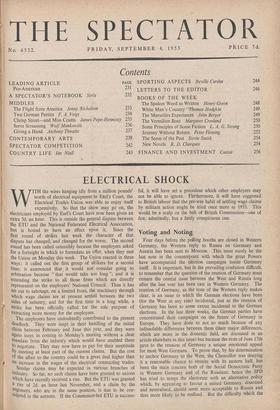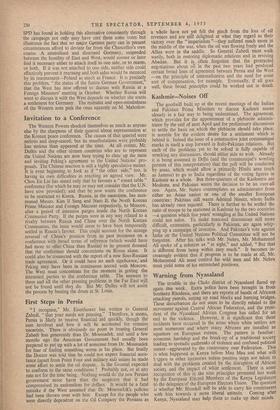Voting and Noting
Four days before the polling booths are closed in Western Germany, the Western reply to Russia on Germany and Austria has been sent to Moscow. This must surely be the last note in the counterpoint with which the great Powers have accompanied the election campaigns inside Germany itself. It is important, but in the prevailing confusion difficult, to remember that the question of the reunion of Germany must remain the central issue between the West and Russia long after the last vote has been cast in Western Germany. The reunion of Germany, as the tone of the Western reply makes clear, is an issue to which the German elections have been (for the West at any rate) incidental, just as the reunion of Germany has been. to some extent incidental to the German elections. In the last three weeks, the German parties have' concentrated their campaigns on the future of Germany in Europe. They have done so not so much because of any indissoluble differences between them (their major differences, which are more in the domestic field, are discussed in an article elsewhere in this issue) but because the riots of June 17th gave to the reunion of Germany a unique emotional appeal for most West Germans. To prove thgt, by his determination to anchor Germany to the West, the Chancellor was denying it a reasonable chance to reunite with its eastern half, has been the main concern both of the Social Democratic Party in Western Germany and of the Russians; hence the SPD has tried to tempt the electorate with an alternative policy which, by appearing to favour a united Germany, disarmed and neutralised, should seem more acceptable to Russia and thus more likely to be realised. But the difficulty which the SPD has found in holding this alternative consistently through the campaign not only may have cost them some votes but illustrates the fact that no major German party can in present circumstances afford to deviate far from the Chancellor's own course. A neutralised and disarmed Germany, suspended between the hostility of East and West, would sooner or later find it necessary either to attach itself to one side, or to rearm, or both. If it was not attached to one side, neither side could effectively prevent it rearming and both sides would be menaced by its rearmament—Poland as much as France. It is precisely this problem, " the status of the future German Government, that the West has now offered to discuss with Russia at a Foreign Ministers' meeting in October. Whether Russia will want to discuss it with the West depends on whether she wants a settlement for Germany. The restraint and open-mindedness of the Western note puts the onus squarely on M. Malenkov.



































 Previous page
Previous page